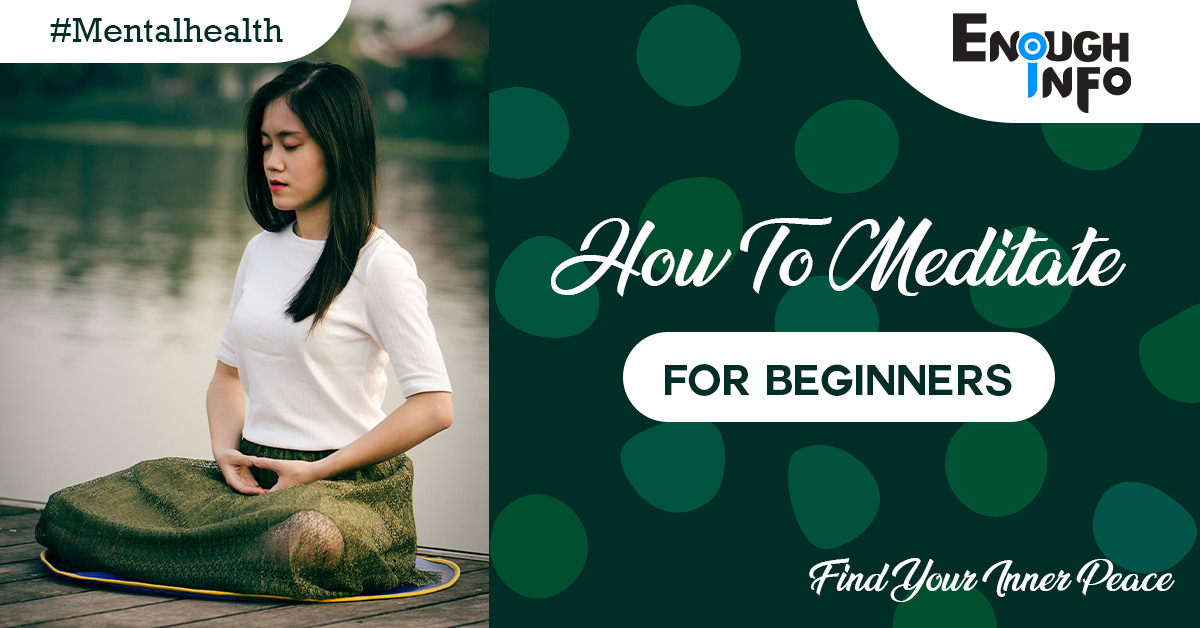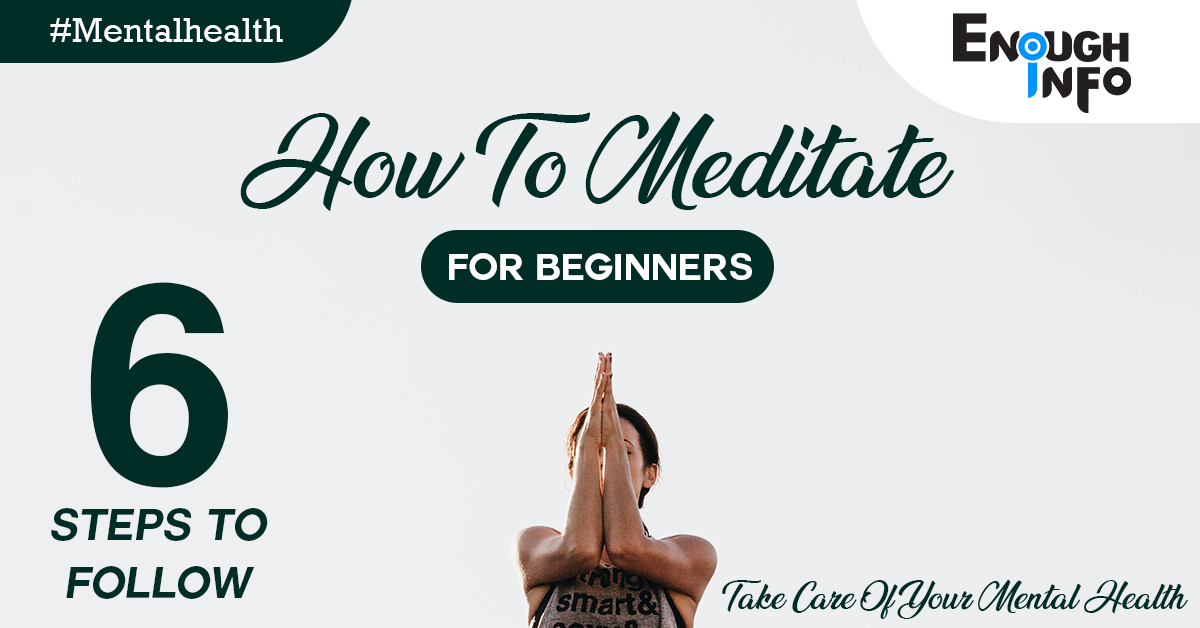How To Meditate For Beginners

How To Meditate For Beginners: In our fast-paced and often chaotic lives, finding moments of calm and serenity is crucial for our overall well-being. Meditation offers a path to cultivate a peaceful mind and connect with our inner selves. EnoughInfo.com

We inject far-reaching and long-lasting benefits into our life when we meditate: we lower our stress levels, we become more aware of our pain, we connect better, we enhance our focus, and we are kinder to ourselves.
Read Also: How To Deal With Stress(Guide2023)
What exactly is meditation?
How do you become a meditator? In mindfulness meditation, we practice paying attention to the breath as it comes in and out, as well as noticing when our minds wander from this goal. This practice of returning to the breath strengthens the attention and mindfulness muscles. How To Make Cold Brew Coffee (Step by step)
When we pay attention to our breath, we are learning how to return to and remain in the present moment—how to intentionally anchor ourselves in the here and now, without judgement.
The concept of mindfulness appears simple—the practice requires patience. Indeed, noted meditation teacher Blessing Cills recalls how her first experience with meditation demonstrated how fast the mind becomes distracted by other pursuits. “I figured, okay, what will it be, like, 800 breaths before my mind wanders?” “And to my utter surprise, I was gone in one breath,” Cils says.
FAQs & Answers on How To Meditate
1. How long do I need to meditate to experience benefits?
Even a short daily practice of 10-15 minutes can yield benefits. Consistency is key in meditation. Gradually increase your practice time as you feel comfortable, but remember that any amount of meditation is beneficial. How To Make Cold Brew Coffee (Step by step)
2. Can I meditate if I have a busy mind?
Yes! A busy mind is a common challenge in meditation. Instead of trying to stop or control your thoughts, practice observing them without judgment. Over time, you’ll develop a greater sense of calm and clarity.
3. Can I meditate lying down?
While sitting with a straight spine is recommended for optimal alertness and focus, you can also meditate lying down if it helps you relax. Just be mindful of the tendency to fall asleep, and find a position that supports both relaxation and awareness.
Read Also: 11 Ways To Relax At Work( All You Need To Know)
4. How do I integrate meditation into my daily routine?
Find a time that works best for you, whether it’s in the morning, during a break in the middle of the day, or before bed. Consistency is key, so try to establish a regular meditation routine. You can also integrate mindfulness into your daily activities, such as being fully present while eating, walking, or doing household chores. How To Remove Stains From Clothes
5. How long will it take to see the benefits of meditation?
The benefits of meditation can vary for each individual. Some people may experience immediate effects, such as a sense of calm or reduced stress, while others may notice more subtle changes over time. Consistent practice is essential to cultivate the long-term benefits of meditation, including improved focus, emotional well-being, and a greater sense of inner peace.
6. Are there any resources or apps to assist in my meditation practice?
Yes, there are several resources and meditation apps available that can support your practice. Some popular ones include Headspace, Calm, Insight Timer, and Buddhify. These apps offer guided meditations, timers, and various mindfulness exercises that cater to different levels and objectives.
Read Also: How To Achieve Inner Peace
Why Should You Learn to Meditate?
While meditation isn’t a panacea, it can surely provide some much-needed breathing room in your life. That is sometimes all we require to make better decisions for ourselves, our families, and our communities. And the most crucial tools you can bring to your meditation practice are some patience, some self-kindness, and a comfy spot to meditate.
When we meditate, we bring about far-reaching and long-lasting changes in our lives. Plus, you don’t need any additional equipment or a costly membership. How To Remove Stains From Clothes
Here are five reasons why you should meditate:
- Recognizing your anguish
- Reduce your stress.
- Improve your communication skills
- Improve your concentration
- Reduce mental chatter
How to Meditate for Beginners: A Step-by-Step Guide to Inner Peace
If you’re new to meditation and eager to start this transformative practice, this step-by-step guide will help you get started and provide answers to common questions you may have along the way. How to tie a tie (A Step-by-Step Guide)

Step 1: Find a Quiet and Comfortable Space:
Choose a quiet space where you can meditate without distractions. It can be a dedicated meditation room, a corner of your home, or any place where you feel at ease. Create a comfortable environment by sitting on a cushion or a chair with good posture. You may also consider lighting a candle or playing soft music to enhance the ambiance.
Step 2: Set a Time and Duration:
Decide on a suitable time for your meditation practice. It can be in the morning to start your day with clarity or in the evening to unwind and release stress. Start with a shorter duration, around 5-10 minutes, and gradually increase it as you become more comfortable with the practice.
Read Also: How To Avoid Distractions While Studying
Step 3: Focus on Your Breath:
Close your eyes and take a few deep breaths to center yourself. Shift your attention to the natural rhythm of your breath. Observe the sensation of the breath as it enters and leaves your body. If your mind wanders, gently bring your focus back to the breath without judgment. How To Make Homemade Pizza Dough
Step 4: Cultivate Awareness of the Present Moment:
Expand your awareness beyond the breath and become mindful of the present moment. Notice any sounds, sensations, or thoughts that arise without becoming attached to them. Practice being fully present in the here and now, accepting each moment as it unfolds.
Step 5: Choose a Meditation Technique:
There are various meditation techniques you can explore as a beginner:
- Scriptural Meditation: The word of God can heal our infirmities and we can also teach others how to meditate the word of God. “For the word of God is alive and active. Sharper than any double-edged sword, it penetrates even to dividing soul and spirit, joints and marrow; it judges the thoughts and attitudes of the heart” Hebrews 4:12
- Guided Meditation: Follow a recorded meditation or use a meditation app that provides guidance and prompts.
- Man Meditation: Repeat a word or phrase silently, such as “Psalm 1:2” or “Joshua 1:8,” to focus your mind and cultivate inner stillness. How To Cook Scrambled Eggs (Step By Step)
- Body Scan Meditation: Slowly scan your body from head to toe, paying attention to each body part and releasing any tension or discomfort.
- Loving-Kindness Meditation: Cultivate feelings of compassion and love by sending positive wishes to yourself, loved ones, and even those you find challenging.
Step 6: Be Gentle with Yourself:
Remember that meditation is a practice, and it’s normal for the mind to wander. Be gentle and patient with yourself. Instead of getting frustrated, gently guide your attention back to the present moment and your chosen focal point.
Read Also: How To Value Yourself
How Much Time Should I Spend Meditating?
Meditation is no more difficult than what we’ve already discussed. It’s that easy… and that difficult. It’s also effective and worthwhile. The trick is to commit to sitting for at least five minutes every day. “One of my meditation teachers told me that the most important moment in your meditation practice is the moment you sit down to do it,” meditation teacher Blessing Ron explains. Because you’re telling yourself right then that you believe in change, that you believe in taking care of yourself, and you’re making it a reality. You’re not just having a value like mindfulness or compassion in your head, but making it a reality.”
According to Amishi Jha, a neuroscientist, 12 minutes of meditation 5 days a week can safeguard and increase your capacity to pay attention. How To Sew A Button (Step-By-Step Guide)
Meditation Techniques and Tips
So far, we’ve covered the basics of breath meditation, but there are other mindfulness techniques that use different focal points than the breath to anchor our attention—external objects like a sound in the room, or something broader, like noticing spontaneous things that come into your awareness during an aimless wandering practice. But all of these routines have one thing in common: we recognize that our thoughts are often in charge. That is correct. Typically, we have thoughts and then act.
Read Also: How To Deal With Anger( The Ultimate Guide)
Conclusion on How To Meditate For Beginners
Embarking on a meditation practice as a beginner is a journey of self-discovery and inner growth. By following these step-by-step instructions, finding a comfortable space, and exploring different techniques, you can establish a foundation for your meditation practice. Remember to be patient with yourself, embrace the present moment, and enjoy the transformative benefits that meditation brings to your life.
Recommended;
How To Treat Shift Work Sleep Disorder
22 Ways To Fall Asleep Fast (The Ultimate guide on Beating Insomnia)
How To Be Less Uptight(The Ultimate Guide)




